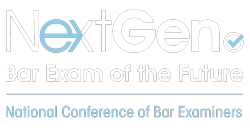About Implementation
NCBE has set a timeline of four to five years for implementation of the NextGen Bar Exam, which will consist of an integrated examination—offered two times per year and delivered by computer—that measures both knowledge and skills through a mix of item formats. NCBE is committed to ensuring a systematic, transparent, and collaborative implementation process, informed by input from and participation by stakeholders, and guided by best practices and the professional standards for high-stakes testing.
The major steps of implementation will include:
Developing content specifications identifying scope of coverage
Evaluating options for computer delivery of the exam
Drafting new types of questions for integrated testing of knowledge and skills
Establishing scoring processes and psychometric methods for equating/scaling scores
Ensuring accessibility for candidates with disabilities
Developing test administration policies and procedures
Field-testing new item formats and new exam content
Conducting analyses and review to ensure fairness for diverse populations of candidates
Assisting jurisdictions to prepare and supporting them in activities such as setting passing score requirements and amending rules to align with changes to the exam
Providing study materials and sample test questions to help candidates prepare



